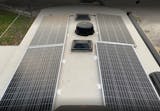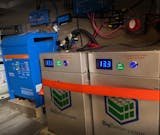STORING LITHIUM IRON PHOSPHATE BATTERIES
LiFePO4 batteries are usually used seasonally for camping in the summer or ice fishing in the winter. Therefore, people commonly store their lithium batteries during off-season. However, it is essential for people to have the knowledge of how to store them properly so that their performance can be optimized for many years ahead. There is barely any maintenance required for lithium-ion LiFePo4 batteries for golf cart, RV & many other applications.
HOW TO STORE LIFEPO4 BATTERIES?
A question frequently asked by customers on a daily basis is: how do I store my lithium battery in both normal and extreme environment? The answer to this question really depends on the period of time and temperature batteries are stored in. Don’t worry, here is a nutshell of how to store your LiFePO4 battery:
- In normal case, store in this temperature: -5 to +35°C (23 to 95 °F)
- If less than a month, store in this temperature: -20 to +60°C (4 to 140 °F)
- If less than three months, store in this temperature: -10 to +35°C (14 to 95 °F)
- If more than three months, store in this temperature: +15 to +35°C (59 to 95 °F)
Storing lithium batteries indoors during off-season is highly recommended. Also, to optimize battery performance, you should make sure your LiFePO4 batteries has a state of charge (SOC) at more than 50% before you store them. It is not recommended to store discharged batteries. What’s more, it is also important to cycle the batteries at least once every 6 months for lifepo4 long term storage
DISCONNECT BEFORE STORING LIFEPO4 BATTERIES
Many batteries have the main switches so that users can turn their batteries off easily. However, in the case that there are no main switches on batteries, it is highly recommended to take an extra step to ensure your battery is completely off and disconnected to the power. Since RVs would have backlit stereo, emergency sensor and CO2 sensor running in the background, this may bypass the main disconnect switch. Therefore, when you are storing the batteries, it’s important to physically disconnect the positive and negative wires from your batteries. By doing this, you can ensure that batteries would not be undercharged during storage time and can be ready for use anytime. Last but not least, you should always make sure to only use the lithium charger.
One thing to keep in mind is that the low self-discharge rate of LiFePO4 batteries is 2% per month, which means a lithium battery will lose 2% of its charge capacity every month during storage time. It is highly recommended to disconnect all power draw from your batteries so that higher rate of discharge can be further prevented. You should always store your lithium batteries with a state of charge of 50% or higher, especially when you want to store for a long period of time. For users who want their batteries to be retained at a good level of charge, it is essential to charge them to 100% and store them at a fully charge state.
HOW TO STORE LIFEPO4 BATTERIES WITH THE SYSTEM
It is recommended to use a battery guardian to protect LiFePO4 batteries if you store your batteries along with the entire system. To be more specific, once the voltage is 11.5V or higher, you can disconnect your batteries from parasitic loads. We also recommend you disconnect all battery connections if there is no disconnect switch installed on your battery. Since a trickle charge is not required by LiFePO4 batteries, it is acceptable to disconnect the charger during storage time.
HOW TO STORE LIFEPO4 IN COLD WEATHER
If the battery pack is not being used, extreme temperature can’t affect lithium cells. It’s not recommended to store lithium batteries in extreme temperatures for a long period of time. Because it’s possible for the ABS casing of the battery pack to crack. Besides, it can damage other components in the battery pack if the temperatures go beyond 60°C (140°F). Therefore, we recommend you to always avoid high temperatures for extended periods of time, which means storing your batteries indoor is the best option.
Frequently Asked Questions (FAQs)
Q. What are Lithium LiFePO4 batteries?
A. Lithium-ion batteries are the most common type of rechargeable battery in use today. They have a high energy density and power and are lightweight. There are many lithium-ion batteries, but the most common is Lithium LiFePO4. It has a higher energy density than other lithium-ion batteries, which means it can store more electricity for a given weight.
Q. What is the most important thing about storing lithium-ion batteries correctly?
A. A lithium-ion battery is a rechargeable type commonly used in portable electronic devices. Li-ion batteries are the most popular rechargeable batteries found in laptops and cell phones. The most important thing about storing lithium-ion batteries is keeping them out of direct sunlight, which can cause the battery to overheat and even ignite.
Q. How do I maintain my lithium-ion Batteries?
A. By charging it correctly and taking good care of it, you can extend the life of your lithium-ion battery. If you're going to store lithium batteries, charge them to 50% and ensure they're holding their charge every two to three months.


















